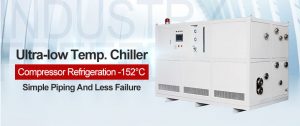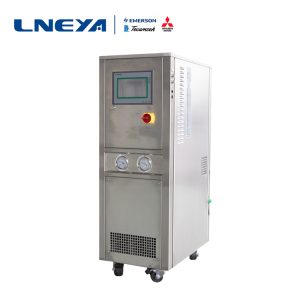Why do chemical raw materials require low-temperature chillers?

The main reasons for using low-temperature chillers in the production process of chemical raw materials are as follows:
Temperature control: Many chemical reactions are temperature sensitive and require precise temperature control to ensure reaction rate, selectivity, and product purity. Low temperature chillers can provide stable low temperature conditions to help maintain the temperature inside reaction vessels, crystallization tanks, or other equipment within a specific range, ensuring that chemical reactions proceed as expected.
Thermal management: Chemical reactions are often accompanied by a large amount of heat release, especially in exothermic reactions. If there is no effective cooling, the reaction system may overheat, leading to side reactions, catalyst deactivation, decreased product quality, and even safety accidents. The low-temperature chiller unit can promptly remove excess heat and maintain a stable reaction environment.
Crystallization optimization: In the crystallization process of chemical raw materials, low temperature helps to form purer and more uniform crystals. The chiller unit can optimize crystallization conditions, improve product purity and yield by precisely regulating temperature.
Material cooling and stability: Some chemical raw materials are prone to decomposition, deterioration, or polymerization at high temperatures. Low temperature chillers can cool the materials to ensure their stable properties and facilitate storage and transportation.
Equipment protection: High temperature operations may damage production equipment, such as sealing failure, pipeline expansion and deformation. The use of chillers can effectively protect equipment and extend its service life.
Safety production: Low temperature control can reduce the risk of accidents when dealing with flammable, explosive, or toxic chemicals, such as reducing the emission of volatile organic compounds (VOCs) to ensure production safety.
In summary, low-temperature chillers play a crucial role in the production of chemical raw materials, not only related to production efficiency and product quality, but also an important means of achieving safety production and environmental protection.
Related recommendations
-
Daily maintenance instructions for heating and cooling circulators
1612After the heating and cooling circulator has been running for a long time, certain maintenance work needs to be carried out, so what should be paid attention to? To ensure the normal operation of the heating and cooling circulator after it is star...
View details -
Failure Analysis of Ultra Low Temperature Chiller Supporting Distillation Equipment
2019Once the freezer used in the matching distillation equipment fails, we need to solve it in a timely and effective manner to avoid affecting the operation of the entire experiment. In the pharmaceutical, chemical and other industries, low temperatu...
View details -
Closed laboratory circulator enameled mixing tanks refrigeration and heating system
1421Closed laboratory enameled mixing tanks refrigeration and heating system
View details -
Explosion-proof high and low temperature one machine manufacturer instructions installation point
1740After the explosion-proof high and low temperature integrated machine is delivered from the factory, it must be installed after reaching the destination. What should you pay attention to when installing? The explosion-proof high and low temperatur...
View details
 LNEYA Industrial Chillers Manufacturer Supplier
LNEYA Industrial Chillers Manufacturer Supplier













